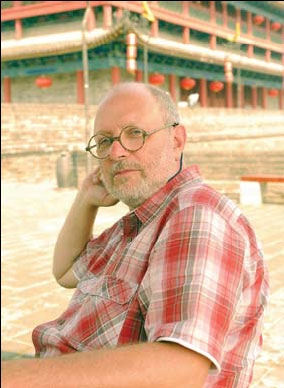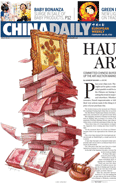Convertible currency on the cards by 2020
Updated: 2010-12-31 10:28
By Andrew Moody (China Daily European Weekly)
The yuan is likely to be fully convertible and on the way to being one of the world's major currencies by 2020, according to some experts.
China's leading stock exchanges are also likely to be opened up to foreign investors and Chinese fund managers will have an impact on markets around the world.
Stuart Leckie, who runs Hong Kong-based consultancy Stirling Finance and has 30 years' experience in the pensions and investment industry in the region, says the next decade will be pivotal as China begins to wield its influence on the world's financial system.
"I would expect the yuan to be fully convertible in 10 years' time and, if not freely convertible, certainly a lot more fully convertible than it is now," he says.

David Goodman, director of the China Studies Centre at the University of Sydney. Provided to China Daily |
The yuan, which has a managed exchange rate against a basket of currencies, is currently a restricted international currency.
It is not used on any significant scale to settle international trade transactions between China and the rest of the world.
The People's Bank of China, China's central bank, however, expanded the number of trade companies qualified for cross-border yuan settlement to 67,359 in early December, from the originally 365.
Within China, however, it is not possible for an individual to convert more than $50,000 worth of yuan in any one year.
The lack of convertibility nonetheless creates problems for China and is partly the reason why the country has $2.6 trillion of foreign currency reserves, a significant portion of which is in US dollars.
Wu Changqi, professor of strategic management at Guanghua School of Management at Peking University, says full convertibility is inevitable.
"I think what we are going through at the moment is a temporary stop-gap phase before this happens. Definitely by 2020 the currency will be fully convertible," he says.
Whether full convertibility would see a significant rise in the value of the yuan is unclear.
In June this year, the People's Bank of China removed the currency's peg to the dollar (which had been re-established during the economic crisis in 2008) and it has risen by 2.5 percent against the greenback this year.
Professor David Goodman, director of the China Studies Centre at the University of Sydney, says any sudden rise in the value of the yuan will not have the beneficial impact that many in the United States, in particular, expect.
"You have had a group of Congressman recently saying the value of the yuan should be raised by 40 per cent (so that US-made goods can be more competitive in the domestic market). I tell you what the effect of that would be. The Chinese economy would become the biggest in the world and the US dollar would completely collapse. It would also have a major effect on Europe since they have major reserves of dollars."
The other big financial question facing China over the next 10 years is whether China's two major stock exchanges in Shanghai and Shenzhen will become fully open to foreign investors.
They are subject to tight capital account controls but the Shanghai bourse, which this year is celebrating 20 years since its re-establishment in 1990, is to begin allowing foreign investors to sell shares in 2011.
If the exchanges are fully opened up, there remains a risk of an influx of hot money and fears of major assets bubbles.
Leckie believes China's stock markets will become increasingly more sophisticated.
"I think there will be more sophisticated markets at home. I think we will see some genuine hedge funds and other different types of investments in China that don't really exist at the moment," he says.
Leckie also believes by the end of the decade Chinese financial brands will become well-known names in the West.
"I think you will see banks like ICBC becoming as widely known as Citibank and HSBC. In 10 years' time, the man on the street will know the names of all the major Chinese banks," he says.
E-paper

Ear We Go
China and the world set to embrace the merciful, peaceful year of rabbit
Preview of the coming issue
Carrefour finds the going tough in China
Maid to Order
Specials

Mysteries written in blood
Historical records and Caucasian features of locals suggest link with Roman Empire.

Winning Charm
Coastal Yantai banks on little things that matter to grow

New rules to hit property market
The State Council launched a new round of measures to rein in property prices.
